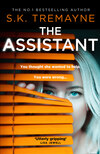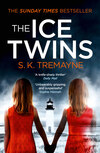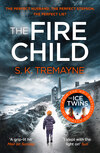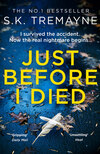Kitabı oku: «The Assistant», sayfa 3
5
Janet
Janet Ferguson was calling for her dog to come in from the cold.
‘Cindy, come on, it’s freezing. You’ll die out there.’ Janet gazed across the frosted grass of her back garden. Where was she? It was hardly a vast, stately acreage of meadows. This was a suburban back garden, darkened by winter, just large enough for a small family: attached to a house designed for a small family. Indeed, now that this small family was gone, and Robert was long dead, and Jo and Will had grown up, Janet had often thought of selling. Moving somewhere else entirely, a one-bedroom flat somewhere central, or out of London altogether.
Thornton Heath depressed her these days, with its tatty signs, and faded cafes, the sudden outcrop of Polish, Romanian, Somalian, Bulgarian shops where she didn’t understand the food, the accents, the people, much as she smilingly tried to fit in. It was an outlying suburb of London that never quite made it, never got gentrified, never got fashionable attention, yet never got quite so rundown the government was prepared to spend money.
It was time, surely, for Janet to make the same move as her friends and neighbours. Yes she would lose the much-loved garden with all its memories. And so be it. Cindy would have to put up with it. Restrictions. Life was all about increasing restrictions. Janet put up with her pacemaker, and monthly visits to the hospital, because that’s simply what you did. Life slowly constricted around you, like a snake that would ultimately kill you. And one day you went into a hospital, and you never came out.
Like Robert. Dead at his own hand, in his early forties.
She remembered the lingerie he’d stuffed in the car exhaust, so he could fill the car with carbon monoxide.
‘Cindy!’
Janet could hear the dog. Right at the end of the foggy, white-frosted garden, probably digging up some old bones, or boots. The radio was calling it the coldest start to January in decades, and likely to get worse. Janet remembered when she was young, the bitter winter of 1963, when it was like this: it kept getting colder and snowier – on and on until March.
But Cindy, it seemed, was determined to have her fun, whatever the weather. And now Janet’s phone was ringing, and vibrating, on the sink.
Closing the kitchen door, Janet reached for her mobile.
‘This is Janet Ferguson.’
‘Mum. What the hell is wrong?’
‘Sorry?’
Her daughter’s voice was urgent.
‘Twenty calls. What’s the matter, Mum? Are you all right? You called me twenty times?’
Janet frowned, puzzled.
‘No, dear. I never called you. Not once.’
‘But my phone says you did!’
‘Well, I don’t know about that.’
‘Twenty times, Mum. It says it right here. Missed calls. Twenty! I was worried about you!’
Unsure what to say, Janet gazed out at the garden. Cindy was chasing a football. A very old, half-burst, dog-chewed football, muddy and mouldy in the murk. Janet remembered Jo and Will playing with it, alongside their father. That long ago. Oh, too long ago. All dead now, that old life was all dead. Where did it go?
She returned to her daughter, and this stilted conversation.
‘Look, darling, it’s nice you’re worried, but I am fine and I’m not going to suddenly call you twenty times in one morning, for no discernible reason.’
‘OK.’
‘I mean, Jo: we speak about once a week, when you remember to ring me? Not twenty times a day.’
It was a tiny barb, but it was designed to sting. Judging by her daughter’s pause, it had done the job. The silence was long enough to be properly awkward. Janet felt obliged to fill it.
‘Isn’t is possible, darling, that your smartphone is playing up? I don’t know why you have those things, dear. Cameras, music, notebook, all in one little machine – what if you lose it? It’s your whole life.’
‘Everyone has them, Mum. Look, Mum, are you sure you didn’t call me?’
‘Yes, I am.’
‘OK, sorry, Mum. I just, I don’t … Ah. Ah. Perhaps my phone is on the blink. Like everything else in this place.’
Janet shrugged, not knowing how to respond. She opened the kitchen door to let the dog come in, shivering snowflakes. As she bent to pat the damp dog, she looked at the kitchen shelf and the framed pictures of her two children, and her lovely grandson Caleb. Then Jo at her graduation. Smiling and confident. The old Jo.
There was something different in her daughter’s attitude this afternoon. Jo was normally so outgoing, can-do, optimistic. Today she sounded vulnerable. Needy. Agitated.
‘Jo … are you all right?’
‘What? Why?’
‘You sound nervous. Are you OK up there, the new flat, Tabitha, everything?’
‘Yes, yes of course, why yes, I’m fine. Fine. Absolutely fine. We’re all fine.’
‘Yes?’
‘Yes! The flat is gorgeous, I love Camden, it’s got a brilliant buzz. The park is around the corner. I can walk to Soho. It’s much better than NW Tundra.’
The answer came far too quickly. Something was definitely wrong.
‘Well, that’s good, that’s nice for you … Hey. You know I got a visit from Simon the other day?’
Another stiff pause. Janet could picture her daughter’s surprised face.
‘Simon? My Si? Simon Todd?’
‘Yes, dear. He does come and visit, sometimes he brings Polly and the baby, so I can see little Grace.’
Her daughter said nothing, Janet sensed a pang of envy, down the line. She hurried on,
‘I mean, his own family still lives down this way, you do remember that? His mum and dad? The Todds around the corner on Lesley Avenue? They’re practically the last people I know from – from the old times. And we’re still friendly, so he pops by.’
‘You mean … my ex-husband is secretly visiting you?’
Janet felt her impatience rising at this.
‘Goodness! It’s not some dark secret, Jo. I always liked Simon, we always got on well. He was a decent husband to you. You know I think that. I always thought that. In fact, I wondered …’
‘Whether things would have been different if we’d had kids? Yes, I know, Mum.’ The sharpness in Jo’s voice was undisguised. ‘You’ve told me several thousand times. Well, I decided not to. And now he’s got one with Polly, so that’s fine, isn’t it? Perhaps you could adopt her as your grand-daughter, since I’m probably not going to give you one, and little Caleb is on the other side of the world.’
This time the barbs stung the mother. Jo was clearly envious, and she was clearly hurting.
Janet sighed, heavily.
Jo got in first.
‘Oh God. Look. Sorry. I shouldn’t have snapped. Sorry, Mum. I’m so sorry! It’s nice that Simon comes to see you, and Polly, and Grace, and everything, that’s nice of him, I should come more often myself.’
‘Don’t worry. I know it’s a long way.’
‘No, it’s not good enough, Mum, I am sorry, I promise I will come over, at the weekend.’
Janet’s witty, bouncy daughter sounded as deflated as that ancient football in the frozen garden. Feeling emboldened, by her concern, Janet decided to reach out.
‘Do you mind my asking something?’
A pause.
‘Go ahead, Mum.’
‘Why didn’t you want children, Jo? Simon was so keen to be a dad, he told me that many times, and he was devoted to you. And I know this led to your divorce, at least in part.’
‘We talked about this; I’d have been a crap mum.’
‘Was it only that, dear?’
‘What are you saying?’
‘Well, last time he was here, we got talking about kids, and Simon hinted that you had worries, about … About …’
It was so difficult to find the right words. Stiffening herself, like the frosted spears of long grass at the end of her garden, Janet carried on: ‘Well, Simon told me you were worried about your father. That any children you had might inherit those genes. Late-onset schizophrenia. Like Robert. He said you were sometimes worried that your kids might get it, or that you might get it and leave your kids without a mother. But you shouldn’t—’
‘Mum!’
‘You mustn’t, dear. You mustn’t let that fear dominate your life. It’s not going to happen. When poor Robert went … you know …’
‘Mad? When Dad went mad?’
‘Yes, when your poor father went mad, the doctors looked into all this: there is no history of it on any side of his family, no suggestion of a genetic cause. He was unlucky, that’s all.’
Jo answered, her tone calm. Even cold.
‘Eighty per cent of schizophrenia is linked to genetic causes.’
‘Yes, but not in his case!’
Janet realized she was raising her voice. She rarely did this with Jo. What was happening between them? She couldn’t remember a mother–daughter phone call as awkward as this, not for a while, not since the divorce. She loved her daughter. She and Jo had a good, honest relationship, even if she sometimes felt a bit neglected. At least Jo did ring, once a week; Will rang once a month, at most. Five minutes of small talk from LA, telling her about Caleb, and that’s your lot.
‘Jo, you sound strained.’
‘I told you, I’m fine, Mum. Just worried about stuff. Sometimes.’
‘Stuff?’ Janet persisted. ‘What kind of stuff?’
‘Just, y’know, stuff. The existential pointlessness of life. The eventual heat death of the universe. Reality TV.’
Janet allowed herself a chuckle. This was more like the usual Jo. She sighed with relief.
‘OK, well, if you’re sure you’re all right. Do come down at the weekend. We could have a spot of lunch?’
‘I will, Mum. I am genuinely sorry I snapped. And I suppose I have been a bit stressed. I keep trying to write these scripts, find a way out, but it’s hard. I’ll end up paying rent for ever.’
‘Ah. I wish I could help, Jo. I wish I had bought this house when we had the chance. Then at least you’d have something to inherit, but when Robert—’
‘It’s OK, Mum. It wasn’t your fault. Ah. Anyhow, I’ve got to go, got to go. OK. Bye, Mum.’
Her daughter sounded distracted. As though someone unexpected had walked into her flat.
Janet said goodbye. They ended the clumsy call. Janet put the phone down on the kitchen table. She stared at those photos on the kitchen shelf. Jo and Will. Next to them stood Robert, as a young man. Mid-thirties. Handsome. Jo and Will certainly got their good looks from him, not from herself. In the photo, Robert was smiling. Entirely sane. Here in the next photo he was in the living room, sitting on the floor with Jo and her childhood friends: Billy, Ella, Jenny, Neil, teaching them all to draw and write and paint. Paper and crayons everywhere, a happy childhood mess. Probably this was about a year before the serious symptoms.
Even now the memories grieved her. Tremendously. The slow remorseless damage his insanity inflicted on their lives, which eventually drove Robert to gas himself in the family car.
Janet could remember the specific day – the specific moment – when she first realized something was truly wrong. When she could no longer deny, or ignore, or pretend he was only a bit eccentric, or stressed.
It was so long ago – several decades – yet the memory was vivid.
She had walked from this kitchen into the living room to watch the evening news. Robert was sitting on the sofa, staring at the TV screen. The screen was black, because the TV was unplugged. Yet they never unplugged the TV. She went to plug it in but as she bent down, he shouted, ‘No, no, don’t do that, Janet! Don’t plug it in! Don’t plug it in!’
Perplexed, she had sat down next to him and asked. ‘Why not? Why can’t I plug it in?’
‘Because it’s talking to me,’ he said, frowning deeply, ‘the television is talking to me.’
6
Jo
The Flask, Highgate. Of course, that’s where we’d go to celebrate Tabitha’s return from Brazil. A quaint, wooden, stained, rickety, middle-class, roaring-fire-and-mulled-wine kind of pub in the nicest part of Highgate, and, it so happens, approximately two and a half minutes’ walk from Arlo’s gorgeous eighteenth-century house with the Damien Hirst spot paintings in the hall. He reserves the best art for his living room, or drawing room, or ballroom, or seventeen-hectare underground sculpture garden, God knows. I’ve only been invited to Arlo’s house once, saw little more than a kitchen as big as my mum’s entire home, and even then I think Arlo would have preferred me to enter by the tradesman’s entrance, or some special tunnel for proletarians.
Traitor’s Gate.
And now I’m in Arlo’s local pub, standing alone. I am several minutes too early. I was so keen to get out of the flat. In case the Assistants turned on me again. If they are turning on me, and it’s not me doing it to myself.
Don’t think about it.
As I wait for everyone else to arrive, I stare at some luridly antique prints on the panelled pub wall. They show famous executions in the area, men hanging from gibbets, cheering crowds. One of the hangings seems to be taking place on top of Primrose Hill. Three men are dangling in a row, barefoot and dancing, grasping at the noose, obviously dying. The engraver has gone to great lengths to get the details of the throttled faces right: the boggling eyes, the protruding tongues, the gruesomely happy, popcorn-munching reactions of the audience.
My research hasn’t told me this. Primrose Hill was a place of execution? The dying, horrified face of the man on the left, apparently biting his own tongue off, as he is slowly asphyxiated, stares directly at me. Right at me. Like it knows. He knows. Who knows?
I am not my father.
Am I? I remember my dad before he lost himself: he was extrovert, full of humour. A frustrated artist who ended up imprisoned in minor accountancy: so he lived, and found joy, through his family. Dad was always ready to have fun, to make me laugh, to chase me round the apple tree pretending he couldn’t catch me. I called him the Ticklemonster and he called me Jo the Go because I could run so fast. He liked to play with words, he liked to play with life. So perhaps I take after him rather than my cautious, conservative mother. Which says?
My anxious, fumbling thoughts – ready to plunge into something worse – are interrupted.
Arlo is at the bar. He gazes at me, blankly confident, arrogantly possessive. I am in his bar. His local. To celebrate the return of my friend, my flatmate. Why did we have to come here?
Because he’s Arlo Scudamore. He is in control. I think he also controls Tabitha. He knows I think that. He also doesn’t apparently care what I think, whether I am hurt or happy, as he is still so bitter about my critical article on the tech giants, where I quoted him as a source supposedly without his permission. He did give permission, he simply didn’t like what I wrote. He claims the article stymied his previously meteoric career. God, I hate his stupid posh-yet-hipster accent. He thinks I’m common? Fuck him. Simon once described Arlo as ‘psychotically ambitious’ and I’ve never forgotten that: it was so accurate.
Stepping around the bar, I say,
‘Hello, Arlo! Lovely to see you.’ And give him a quick double non-kiss air-kiss.
‘Ah, Jo. Hello, so glaaaad you could make it!’
He returns the duo of non-kisses. I had no idea social greetings could be this insincere.
‘Where’s Tabs?’
‘Vaping outside, swathed in perpetual smoke like some hydrothermal vent.’
Who, or what, is a hydrothermal vent? I have no idea. He probably said it to make me feel insecure. So we are stuck, in a corner of the Flask. Just me and him and rows of glittery obscure new artisanal gins on the mirrored shelves behind the bar, and the deeply sinister prints of the local executions on the wall, and a lovely roaring woodfire in the mighty hearth. Waiting for everyone else to arrive.
‘Everything OK at, uh, work? Facebook?’
This is probably the most irritating thing I could ask him. Which is possibly why I ask it. He does the same to me all the time. Needling Arlo at least takes my mind off my own deepening vortex of worries.
‘Work? Oh, superb. I’ll be leaving in a week or two. For the start-up.’ His smile is so icy it could kill wintering songbirds at twenty metres. ‘Ah!’ The smile becomes brighter, warmer, even real. ‘Here’s Jeremy. Lex! Rollo.’
Rollo.
Rollo.
Arlo has an extraordinary number of posh, pink-faced friends with names that end in O. Hugo. Rollo. Theo. Rocco. Orlando. Otto. I think Otto is a ‘Von’ as well. They are all stupidly rich. Dutch bazillionaires. French bankers. Film directors. Venture capitalists investing in Arlo’s Big New Thing, which is all to do with Artificial Intelligence and FinTech, and other stuff I Officially Cannot Understand. I know some of these guys by sight, but they barely know me. I am clearly only here because of Tabitha. If I am lucky, one or two university friends that me and Tabs share might show up, diluting my social isolation.
But as I have recently confirmed, to my own dismay, most of my friends now live out of town.
‘Jo!!’
Ah. A slender blonde girl tucking a vape in her chic denim jacket is smiling, broadly, my way.
‘Jo! Darleenk!’
She does a heavy, fake, theatrical German accent when she’s in a good mood.
‘Heyyy, Tabs! You didn’t get eaten by jaguars!’
My friend skips towards me and gives me a big big hug and a kiss where her lips actually touch my skin. I realize, with a hidden but painful cramping sensation, how much I’ve missed physical interaction. No one has touched me in days, let alone hugged or kissed me.
‘Jo-Jo babe. How are you!’
‘Oh God, fine! You? Brazil? Peru? What happened?’
‘Put it this way, if I have to film another tiny, critically endangered tree frog, I will dedicate my career to wiping out amphibian life. I will shoot a fucking newt.’
We laugh. We hug again. I sooooooo want this. I so need this.
Freelance journalism, I have realized, doesn’t even make you free, it can all too easily imprison you in your flat, devoid of human contact, and you don’t get out of pyjamas from Monday to Wednesday. And freelancing plus digital technology is worse. All the significant conversations I have had this week have been with the digital world.
Since I went freelance five years back, I’ve discovered quite how much people don’t even want to talk. Rather than pick up a phone, they will go to great lengths to text or email. They want to type and WhatsApp and message, so they can edit and censor. Curate themselves: their souls and their discourse.
I should have put this in the article which so annoyed Arlo. The fact that tech was fucking up our social lives, fucking up our humanity, our interactions, our everything. And in return is it fucking with me?
‘Arlo!’
‘Theo.’
‘Cicero.’
The Os have turned out in force. Tabitha chats with them. I stand alone. The executed man dangling from the gallows on Primrose Hill sticks his vile and blackened tongue in my direction. My thoughts return to the machines in my home, undermining me, throwing me off-balance, and a question forms. Could this be Arlo’s doing? Is it some kind of cynical vengeance? He’s certainly clever enough, and controlling enough. He’d probably find it loftily droll and piquant. Using the same tech I criticized to gaslight me, to send me round the bend.
His dislike of me, based partly on pure snobbery, was confirmed by my so-called journalistic betrayal. When I first moved to Delancey, he came round and looked at my paltry wardrobe and delivered a litany of acidic remarks about how lucky I was to live in that flat, when I could have been stuck in some horrible bedsit in nowhere, perhaps along the A40 ‘breathing in pure carbon monoxide’. He actually said that. And he knows how my poor dad died. And then, he added, for good measure: ‘Instead, you get to live here, with the smart TV, the Assistants, the smart lighting – you have only to ask for music and it floods the rooms, and all of it is made by those companies you hate. How … ironic?’
I stare across at him, framed by the shelved arrays of fashionable gins, surrounded by his eager peers. He is chortling in that austere way he has. Like he finds laughter slightly vulgar but will indulge in it for close friends as a favour. He is handsome and fit; aristocratically cheekboned, yet somehow not sexy at all. At least not to me.
Tabitha relieves my tense isolation by handing me a drink. A fluted glass.
‘Proper champagne, Perrier Jouët!’ She grins, and tilts her head at her fiancé and his moneyed pals. ‘You hanging back? Can’t blame you. Arlo is actually discussing blockchain with some of his bankers. What the hell is blockchain? Does anyone know?’
We are already a few yards from the main social group by the bar. Physically sidelined: symbolically lesser. I look down at the inviting glass tulip of golden-bubbling alcohol. Should I feel guilt for guzzling Arlo’s champagne when I dislike him so much? Nope. I tilt the flute and gulp the fizz so quickly it makes me sneeze bubbles. The glass is trembling in my slightly trembling hand. I am revealing my hideous anxieties.
Tabitha frowns, looking at my glass, which I quickly set down on the bartop.
‘Heya. Are you all right? Everything OK at Delancey?’
This is the time to mention it. She has cued me up. This is my chance to offload, share, ask for help, mention the Assistants, the possible malfunction. In them. Or in me. The taunts. The music. The clownish horror show. And yet I cannot. Because the conversation would rapidly come back to the deeper reason: the death of Jamie Trewin. And we have vowed never to discuss this between us; vowed on our lives, vowed on the lives of both our families. And we have kept that vow: it’s not something I can easily break. I want to. But I can’t. For a start, Tabitha might throw me out, and then I’d have to go and live on the A40 and breathe pure carbon monoxide.
Also, the Assistants have been quiet the last day or two. Nothing has happened since I rang my mum. This does not help me, as it leaves me open to the possibility that I am becoming schizophrenic like my father.
But that is so chilling I do not think about it.
Ever.
Do. Not. Think. About. It. It. It. It. It. It is listening to me. Talking to me. The TV is talking to me. Like it apparently talked to my dad. A voice from the dark. I was too young to understand, at the time, but I’ve learned since that this was the first symptom of the disease that killed him a few years later.
The TV started talking to Dad the way the machine, Electra, has started talking to me. Which suggests I am my dad? I will end my days gassed in a car?
‘Jo? You OK?’
I come to, with a jolt. I must have been silent for a minute, lost in myself. My dad did that too. Before he got scary. Before his tickling got aggressive and I ran to Mummy. Before his madness cost me friends. Dave, Jenny, others, many, all driven away. At least it made me self-reliant.
Looking at my flatmate, I force a smile.
‘I’m good, Tabs. Working. Bit bored. You know you’ve come back to the coldest winter since mid-period Charles Dickens.’
She shudders.
‘I noticed. There were penguins in the Arrivals Lounge.’
‘So how was it?! How was the documentary, the jungle, the trip? What’s the Amazon like? I’ve always wanted to go. God, you’re so lucky!’
She chuckles.
‘Insects.’
‘Sorry?’
‘That’s what the Amazon is like, babe. Insects. You don’t see any wildlife because the jungle is too thick, a wall of endless green. But my bloody God you see insects – mosquitoes like buzzards, killer centipedes, spiders that exude poison.’
‘OK …’
‘Fire ants literally attacked my rucksack. Seriously. They tried to eat it. It’s got little white marks all over it, from the formic acid where they bit. And then at night that’s all you hear.’
‘What?’
‘Insects! Shrieking. They actually shriek.’ She knocks back her own glass of bubbles. ‘Also giant rats. Lois hated the whole thing. Said we had to do Greenland next. Anywhere with zero insect life.’
Lois is her presenter. The star of the nature documentary series that Tabitha co-produces.
‘The only interesting bit was when a tapir fell in the swimming pool.’
I gaze her way. Wide-eyed. Tabitha always has adventures and tales. We used to eagerly share these adventures: backpacking together through Bolivia and Colombia, fending off overly persistent tantra masseurs in India, then life caught up with us and we had to get sensible. I stopped travelling; she still travels for her work, and comes home with stories. And I need good stories tonight, to take my mind off my flat, to take my mind off my mind.
‘You had a swimming pool? I thought you were like, lost in the wilderness, surrounded by piranha – wasn’t that the idea?’
Tabitha nods, chuckling.
‘Yeah. But towards the end we got so bored of the tents and the mozzy bites we went to some hotel near Iquitos which had a pool. But the pool was right on the edge of the jungle and a tapir wandered out of the forest and tried to have a drink and then fell in the pool. And then the tapir panicked and did a humongous poo in the pool and no one knew how to get the poo out. Have you ever had a swim in a pool full of tapir poo? It’s not ideal.’
I am laughing, loudly. Maybe too loudly: showing my inner angst. But it’s great to have Tabitha back. A genuine friend. My old friend. How I have lacked this.
For a while we politely rejoin Arlo, but the bankers are talking about cryptocurrencies, and Tabitha and I exchange knowing glances – and then she kisses Arlo decorously on the cheek and says,
‘Nipping out for another vape, sweetheart. Don’t put too much money into Aetherieum, it will crash.’
He half acknowledges her; while she murmurs to me,
‘Wanna come with? They’ve got patio heaters.’
Openly relieved, I follow her outside into the pub garden. It is bitterly cold but yes there are red-glowing patio heaters. Staring at them, I say,
‘Greatest invention since—’
Tabitha interrupts:
‘Facebook?’
She is grinning, playfully. Making a point.
‘Don’t. Please. Please don’t.’ I sigh, feeling helpless. ‘Oh God, Tabby, I do try and get along with him, but … he’s from such a different world. I mean, you’re posh enough but he’s basically like the Queen. He probably looks down on the Queen, coz she uses Tupperware.’
‘Yesss,’ she drawls, in her amused voice. ‘Plus he thinks you scuppered his inevitable ascent to becoming Emperor of the Internet,’
I raise a cold hand in protest,
‘I didn’t!’
Tab smiles her perfect, regular, white-toothed smile. I have quite nice teeth but they are a bit crooked. Thornton Heath teeth.
‘I know, darleenk, I know. But you remember how he is. And now he’s got that bonkers start-up ready to kick off, he’s convinced it will be the next unicorn. Make him a billion. Like he needs more money. Anyway he’s particularly touchy. Don’t pay any attention to him.’
I want to ask her: what do you see in him? But I can’t. She genuinely loves him. She’s told me. I know they have good sex. I know they go to fashionable sex parties. Killing Kittens, Kinky Salon. Maybe that’s all it is: sex. Also, Tabitha can be, for all her confidence, oddly insecure, at times. She has panic attacks. Her dad left home when she was ten or so, upped and walked out the door with a new mistress half his age. Therefore Arlo’s wealth thus gives her an extra level of security. Plus the sex.
Tabitha is smoking an actual cigarette; not a vape.
I stare at her.
‘Uh, thought you’d given up?! You practically put on a West End musical about it: Tabitha Gives Up!’
She giggles, shrugs. The red glow of the patio heaters gives her pretty face an eerie redness, looming and ominous. And I can’t help staring at it. This devilish cast to her face. A beautiful red demon face in the dark of an eighteenth-century Highgate pub garden, in the deep dark cold of a harsh London winter. Where sad and lonely women drag their little children through the snow.
‘I started again in Peru, I thought the fag smoke might drive away the mosquitoes. It didn’t, but I got hooked. Don’t tell Arlo – he’ll be scandalized, and refuse to go down on me.’
Her face is still very red from the heaters. Demonic. Satanic. Or is this image in my head? She speaks, the teeth even whiter, contrasting with the red. I think of fangs. Vampiric fangs. Sucking blood from my neck as I sleep. Tabitha. Who was there in the tent with me that day. I wonder if she has told Arlo about what happened with Jamie Trewin, all those years ago? I long to ask. Instead, I say,
‘Guess you’re staying at his place tonight?’
She nods, and frowns my way, refusing to be embarrassed.
‘Yes. You know, I am allowed to, it is my choice.’
‘Oh?’
She sighs smoke. ‘You think he controls me.’
‘No. I think he infantilizes you. Like he’s your parent. He looks after you. Punishes you for infractions.’
‘Well, yeah,’ she says, exhaling unconcerned coils of smoke quite exuberantly. Breathing demon fire. ‘Sure. WhatEVAH. Look, let’s not have some hideous falling out, darling, not on my first day back. And please don’t tell Arlo about the smokes. He would definitely give me a telling off if he found out.’ She fumes more smoke into the cold night air. ‘The fact is, Jo, I don’t mind being looked after, even ordered about, when I’m off duty. You see? You do understand why? I have to be super-controlling in my job, so when I get back to town I quite like being the little woman. Or the princess.’ She smirks shamelessly. ‘Isn’t that terrible? I actually like to let him do everything. Let him take care of me, let him decide which restaurant we go to. Let him choose the wine, even the food. Then I let him pay. Is that so very bad? Am I a terrible feminist? Oh well. Fuck it.’
I try not to see the unsettling red glow of her face and instead I gaze in her friendly eyes and think: maybe she’s right. Someone to look after you? I consider the idea of someone to look after me. I’d love that. Someone special, someone of my own, someone who makes me feel secure. Someone to buy me a nice meal in a nice restaurant then make love to me, nicely.






